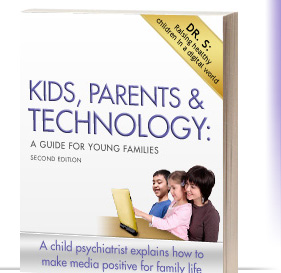Dr. S comment:
New study shows how media are dumbing down infants.
After over ten years of relatively chaos in children’s media exposure, reliable studies are now beginning to show how media can be damaging to human development starting very early in life. It is in the first years that the brain is actually wired, and many times irreversibly. What can parents do?
Because media is here to stay, its thoughtful deployment is the practical and best answer, not just blocking or limiting it. In fact, it can be good for kids, just as parents can make food consumption healthy by giving nutrients instead of junk. Parents can now be empowered, educated, and given the tools to maximize the positive and eliminate the adverse effects of media. See www.mydigitalfamily.org and “Kids. Parents & Technology: A Guide for Young Families.”

Vol. 164 No. 12, December 2010
Infant Media Exposure and Toddler Development
Suzy Tomopoulos, MD; Benard P. Dreyer, MD; Samantha Berkule, PhD; Arthur H. Fierman, MD; Carolyn Brockmeyer, PhD; Alan L. Mendelsohn, MD
Arch Pediatr Adolesc Med. 2010;164(12):1105-1111. doi:10.1001/archpediatrics.2010.235
Objective To determine whether duration and content of media exposure in 6-month-old infants are associated with development at age 14 months.
Design Longitudinal analysis of 259 mother-infant dyads participating in a long-term study related to early child development, from November 23, 2005, through January 14, 2008.
Setting An urban public hospital.
Participants Mothers with low socioeconomic status and their infants.
Main Exposure Duration and content of media exposure at age 6 months.
Main Outcome Measures Cognitive and language development at age 14 months.
Results Of 259 infants, 249 (96.1%) were exposed to media at age 6 months, with mean (SD) total exposure of 152.7 (124.5) min/d. In unadjusted and adjusted analyses, duration of media exposure at age 6 months was associated with lower cognitive development at age 14 months (unadjusted: r = –0.17, P < .01; adjusted: β = –0.15, P = .02) and lower language development (r = –0.16, P < .01; β = –0.16, P < .01). Of 3 types of content assessed, only 1 (older child/adult–oriented) was associated with lower cognitive and language development at age 14 months. No significant associations were seen with exposure to young child–oriented educational or noneducational content.
Conclusions This study is the first, to our knowledge, to have longitudinally assessed associations between media exposure in infancy and subsequent developmental outcomes in children from families with low socioeconomic status in the United States. Findings provide strong evidence in support of the American Academy of Pediatrics recommendations of no media exposure prior to age 2 years, although further research is needed.
Author Affiliations: Department of Pediatrics, New York University School of Medicine–Bellevue Hospital Center (Drs Tomopoulos, Dreyer, Berkule, Fierman, Brockmeyer, and Mendelsohn), and Department of Psychology, Manhattanville College, Purchase (Dr Berkule), New York



Dr S. Comment: Infant Media Exposure and Toddler Development
Dr. S comment:
New study shows how media are dumbing down infants.
After over ten years of relatively chaos in children’s media exposure, reliable studies are now beginning to show how media can be damaging to human development starting very early in life. It is in the first years that the brain is actually wired, and many times irreversibly. What can parents do?
Because media is here to stay, its thoughtful deployment is the practical and best answer, not just blocking or limiting it. In fact, it can be good for kids, just as parents can make food consumption healthy by giving nutrients instead of junk. Parents can now be empowered, educated, and given the tools to maximize the positive and eliminate the adverse effects of media. See www.mydigitalfamily.org and “Kids. Parents & Technology: A Guide for Young Families.”
Vol. 164 No. 12, December 2010
Infant Media Exposure and Toddler Development
Suzy Tomopoulos, MD; Benard P. Dreyer, MD; Samantha Berkule, PhD; Arthur H. Fierman, MD; Carolyn Brockmeyer, PhD; Alan L. Mendelsohn, MD
Arch Pediatr Adolesc Med. 2010;164(12):1105-1111. doi:10.1001/archpediatrics.2010.235
Objective To determine whether duration and content of media exposure in 6-month-old infants are associated with development at age 14 months.
Design Longitudinal analysis of 259 mother-infant dyads participating in a long-term study related to early child development, from November 23, 2005, through January 14, 2008.
Setting An urban public hospital.
Participants Mothers with low socioeconomic status and their infants.
Main Exposure Duration and content of media exposure at age 6 months.
Main Outcome Measures Cognitive and language development at age 14 months.
Results Of 259 infants, 249 (96.1%) were exposed to media at age 6 months, with mean (SD) total exposure of 152.7 (124.5) min/d. In unadjusted and adjusted analyses, duration of media exposure at age 6 months was associated with lower cognitive development at age 14 months (unadjusted: r = –0.17, P < .01; adjusted: β = –0.15, P = .02) and lower language development (r = –0.16, P < .01; β = –0.16, P < .01). Of 3 types of content assessed, only 1 (older child/adult–oriented) was associated with lower cognitive and language development at age 14 months. No significant associations were seen with exposure to young child–oriented educational or noneducational content.
Conclusions This study is the first, to our knowledge, to have longitudinally assessed associations between media exposure in infancy and subsequent developmental outcomes in children from families with low socioeconomic status in the United States. Findings provide strong evidence in support of the American Academy of Pediatrics recommendations of no media exposure prior to age 2 years, although further research is needed.
Author Affiliations: Department of Pediatrics, New York University School of Medicine–Bellevue Hospital Center (Drs Tomopoulos, Dreyer, Berkule, Fierman, Brockmeyer, and Mendelsohn), and Department of Psychology, Manhattanville College, Purchase (Dr Berkule), New York